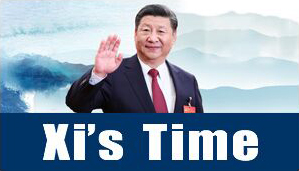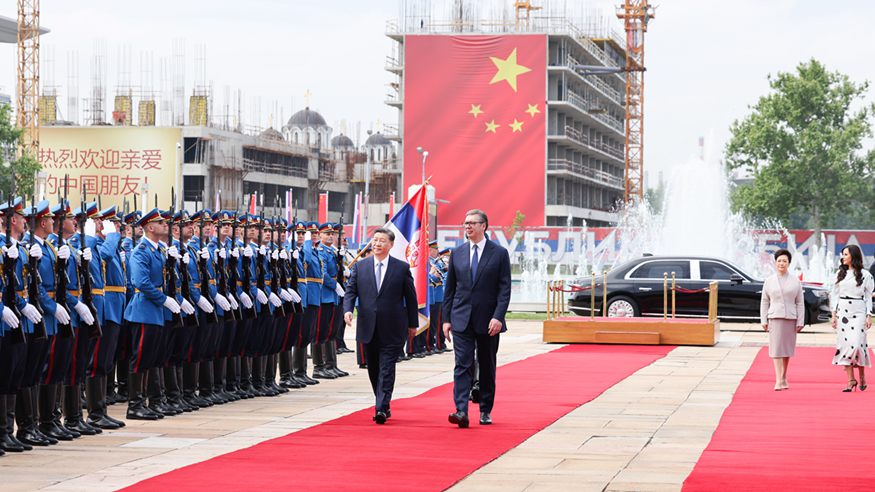Upgraded China-Hungary ties will spur the deepening of the bilateral relations, observers say, believing the partnership will also further energize China's expanding cooperation with Central and Eastern European countries.
BUDAPEST, May 10 (Xinhua) -- China and Hungary on Thursday elevated their relations to an all-weather comprehensive strategic partnership for the new era.
The decision was made during the talks between visiting Chinese President Xi Jinping and Hungarian Prime Minister Viktor Orban.
The upgrade will definitely spur the deepening of China-Hungary relations, observers say, believing the partnership will also further energize China's expanding cooperation with Central and Eastern European countries (CEEC).
CLOSER RELATIONS
China-Hungary relations are currently the best in history as the comprehensive strategic partnership has seen robust and high-speed development.
With deepening political mutual trust and fruitful cooperation in various fields, the two countries have set a model for building a new type of international relations, Xi said during the talks with Orban.
This year marks the 75th anniversary of the establishment of diplomatic ties between China and Hungary, ushering in a new and important opportunity for the development of bilateral relations, Xi said.
Elaborating on the decision to elevate bilateral relations at a joint press conference with Orban, Xi said he and Orban agreed that China and Hungary have always been good friends that trust and support each other as well as good partners that seek win-win cooperation over the years.
It is natural for the two countries to further upgrade relations and enrich bilateral cooperation, said the Chinese president.
The two sides should take the establishment of the all-weather comprehensive strategic partnership for the new era as an opportunity to inject new and strong impetus into bilateral cooperation and create a better future for the two peoples, Xi said.
"The decision has further enriched China-Hungary relations, and further consolidated the foundation of and increased space for their future cooperation," said Wang Lei, associate professor at the School of Government of Beijing Normal University.
In a joint statement on the upgrade of their relationship, both China and Hungary said the two sides are committed to enhancing synergy between the Belt and Road Initiative (BRI) and Hungary's "Eastern Opening" policy.
Leveraging mechanisms and platforms such as the China-Hungary Inter-Governmental Belt and Road Cooperation Committee and the Belt and Road Cooperation Promotion Center, the two sides will pursue deeper and more substantive progress in high-quality Belt and Road cooperation, jointly ensure the safety and security and smooth progress of relevant cooperation projects between the two countries, and strive for more fruitful results in practical cooperation, the statement said.
The Hungarian side is looking forward to further cooperating with China in terms of foreign trade, capital investment, infrastructure, logistics, artificial intelligence, and new energy, among others, said Hungarian Minister for National Economy Marton Nagy.
STRONGER COOPERATION
The upgrade of the partnership came one day after China and Serbia decided to build a community with a shared future, also an elevation of their relations from a comprehensive strategic partnership established eight years ago.
Elevating relations with Serbia and Hungary, two important countries in Central and Eastern Europe, has highlighted China's dedication to fortifying win-win cooperation with the region.
During his talks with Orban here on Thursday, Xi said that the cooperation between China and CEEC has a strong internal driving force, expressing the hope that Hungary will continue to play an important role in promoting the China-CEEC cooperation to better benefit people of various countries.
Most countries in Central and Eastern Europe are emerging markets, holding substantial potential, notably in connectivity and energy investment.
By synergizing their strengths, China's deeper cooperation with relevant countries not only enhances their economic and social development, but also fosters the European integration process.
This strategic alignment has been strengthened by robust investment flows. From January to March 2024, China's investment in Central and Eastern Europe surged by 36.35 percent from one year earlier, reaching about 450 million U.S. dollars. As of March 2024, the cumulative total of Chinese investment in the region soared to 5.2 billion dollars.
Take Hungary as an example. In 2023, Hungary attracted a total of 13 billion euros (about 13.86 billion dollars) in foreign direct investment, of which about 8 billion euros (about 8.53 billion dollars) were from China, said Nagy, Hungarian minister for national economy.
That is also the case for Serbia. "During the past two years, China has emerged as the largest foreign direct investor in Serbia, bringing numerous benefits to the country," said Jelena Grubor Stefanovic, director of representative office of Serbian Chamber of Commerce and Industry in China.
"Now Serbia has more opportunities to systematically focus its efforts on attracting investments from China in industry sectors with high added value like life sciences, digital economy, automotive industry, smart agriculture sector and green development," she said.
These investments, coupled with collaborative projects under the BRI, such as the Hungary-Serbia Railway, continue to benefit the people along the routes in the region.
Chen Fengying, a researcher at the China Institutes of Contemporary International Relations, said that China's growing cooperation with Serbia and Hungary has incented local economic growth and bettered people's livelihood.
The success serves as a compelling example, showcasing the tangible benefits from closer partnerships with China and joint development, said Chen.
Such achievements have also exerted a noteworthy inspirational and motivational influence on other countries in the region, she added.
(Video reporters: Li Shuyan, Liu Chunhui, Li Yaguang, Chen Hao, Yuan Hengrui; Video editors: Hong Ling, Hui Peipei, Li Qin, Wei Yin, Cao Ying, Shi Peng, Wang Han)■





